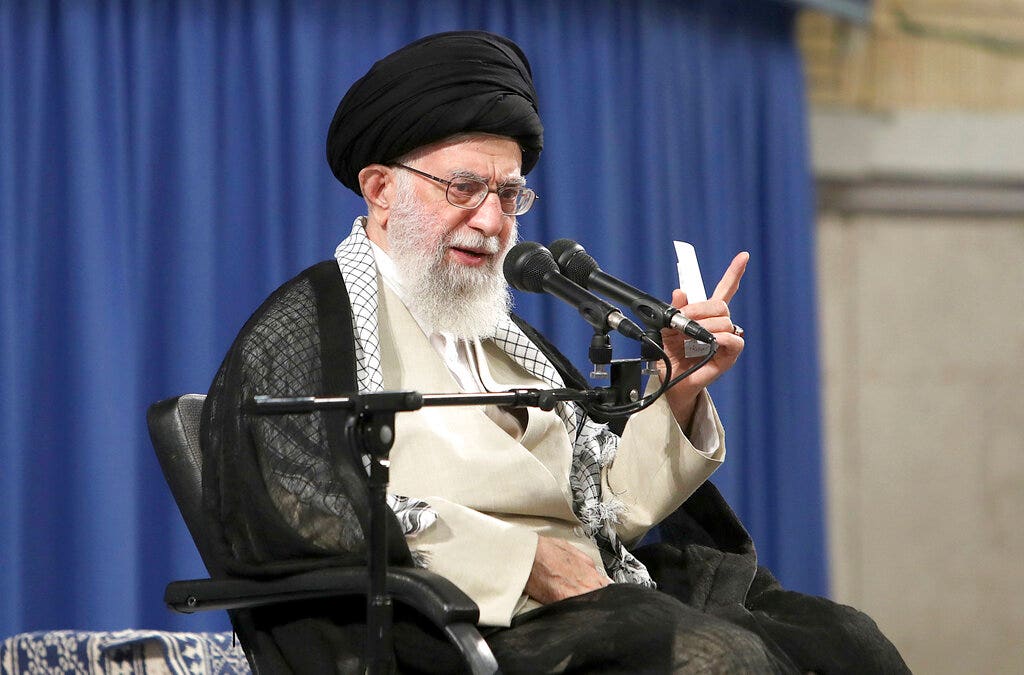Iran's President Hassan Rouhani issued a fresh ultimatum Wednesday over its civilian-use nuclear program, saying the country would on Sunday "take the next step" toward increasing its enrichment of uranium unless European powers are able to find a way to offset the impact of the Trump administration's sanctions on its economy.
Earlier this week, the International Atomic Energy Agency, the United Nations' nuclear watchdog, confirmed Iran passed the limit on its stockpile of low-enriched uranium by exceeding the 300kg (661 pounds) that was set in a landmark 2015 nuclear deal made with world powers. President Donald Trump has pulled the U.S. out of that agreement.
The higher-level enrichment Rouhani said will commence July 7 is still far off the levels Iran would need to produce weapons-grade nuclear materials, but it narrows the time it would take to make a nuclear bomb – something Iran says it does not want to do.
Speaking during a Cabinet meeting in Tehran on Wednesday, Rouhani warned that because of the faltering nuclear deal Iran was entitled to increase its enrichment of uranium to "any amount that we want, any amount that is required."
Under the current terms of the nuclear deal negotiated by President Barack Obama, Iran is not allowed to enrich uranium above 3.67%, a level that is sufficient to operate its nuclear power plants, but falls below weapons-grade levels of about 90%.
"What does it mean that Iran has technically breached one of the limits of the historic anti-nuclear deal? It is not a sprint to a bomb. They are a long way away," Joseph Cirincione, president of Ploughshares Fund, a San Francisco-headquartered global security foundation, wrote on Twitter on Monday as part of a lengthy thread that explains how much enriched uranium is required to produce a nuclear bomb.
Cirincione forecast Iran, if it wanted to, would be about a year away. Other analysts and former officials have said it could take two years or as little as six months.
Iran wants European signatories to the deal – Britain, France and Germany – to come up with a plan to stave off the impact of U.S. sanctions targeting its oil industry and top officials, including Iran's supreme leader, and caused large currency fluctuations.
"They have now breached their stockpile limit. Not good!," Trump tweeted late Tuesday. He did not say if further punitive measures are being planned.
Trump has previously warned that Iran will be met with "great and overwhelming force" if it attacks U.S. interests. His comments followed the apparent sabotage of oil tankers in the Persian Gulf and the shooting down, by Iran, of a U.S. drone off its coast.
Iran's Foreign Minister Mohammad Javad Zarif said Wednesday that his country remains committed to the nuclear deal as long as European nations keep honoring it.
But he warned that European parties needed to fully operationalize a U.S.-sanctions-circumventing financial mechanism to allow Iran to its trade good and services internationally or Iran would further modify its relationship with the accord.
"Iran's violation of one its consequential commitments under the deal should be seen for what it is: a calibrated response to compel the remaining signatories (Europe, Russia, and China) to counter the U.S. 'maximum pressure through sanctions' campaign, just as was its downing of an unmanned drone," write Gérard Araud, a former Ambassador of France to the United States, and Ali Vaez, a leading Iran analyst at the International Crisis Group think tank, in an opinion piece in Foreign Policy magazine this week.
"But it also should be seen as a warning shot, a signal that should economic pressure remain, Tehran is likely to up the ante and accelerate its nuclear program," they write.
https://www.usatoday.com/story/news/world/2019/07/03/trump-iran-crisis-hassan-rouhani-issues-new-nuclear-deal-ultimatum-over-uranium-enrichment/1637045001/
2019-07-03 08:54:00Z
52780324222554




